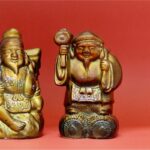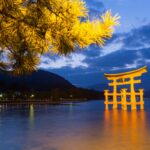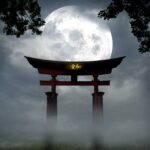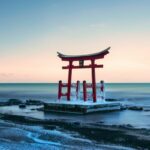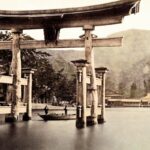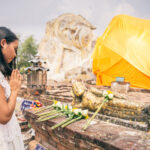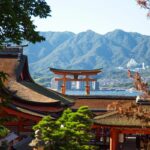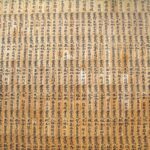The common Japanese belief is that there are Shinto spirits, gods and goddesses for everything.
From weather phenomena and rituals to different nature spirits, the Japanese even have a saying that there are eight million Shinto deities.
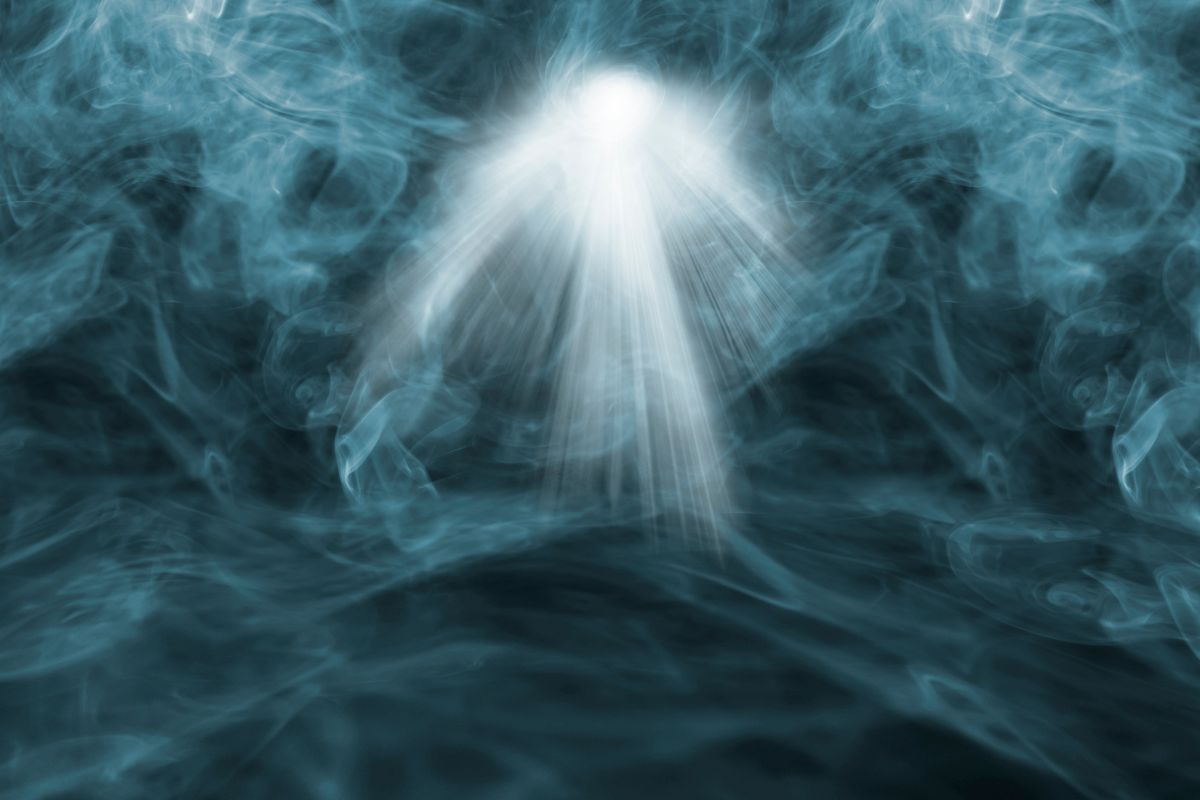
While this number isn’t literal, it shows that there is almost an endless number of divinities for every part of Japan and Japanese life.
Here are 120 of the most popular Shinto gods, goddesses and spirits.
1. Aki-Bime-no-Kami (秋毘売神)
Aki-Bime-no-Kami is the Shinto goddess of autumn.
2. Takuhatachiji-Hime-no-Mikoto (栲幡千千姫命)
Takuhatachiji-Hime-no-Mikoto is the goddess of sewing and fabric.
3. Amatsu-Hikone-no-Mikoto (天津日子根命)
Amatsu-Hikone-no-Mikoto is an ancient god adopted by many Japanese aristocratic families and clans.
4. Munakatasan-Jyoshin (宗像三女神)
Munakatasan-Jyoshin are three sea goddesses who protect the nautical routes between Korea and Japan.
5. Ajisukitakahikone-no-Kami (阿遅鉏高日子根神)
Ajisukitakahikone-no-Kami is the Shinto god of agriculture and thunder.
6. Takamimusubi-no-Kami (高御産巣日神)
Takamimusubi-no-Kami is the earliest primordial god of Shinto.
7. Amanozako (天逆毎)
Amanozako is a powerful Shinto goddesses born out of fury.
8. Sugiwara-no-Michizane (菅原道真)
Sugiwara-no-Michizane was a widely known politician, poet and scholar. His death is said to have resulted in certain calamities of the Imperial court.
9. Okitsuhiko-no-Kami (興津彦神)
Okitsuhiko-no-Kami is the Shinto god of hearth and blaze.
10. Nunoshihime-no-Mikoto (渟熨斗姫命)
Nunoshihime-no-Mikoto is the wife deity of the Kogane shrine in Gify City.
11. Ame-no-Mihashira-no-Kami (天御柱神)
Ame-no-Mihashira-no-Kami is the Shinto god of wind.
12. Amaterasu Ōmikami (天照大神)
Amaterasu Ōmikami is the Shinto goddess of the sun.
13. Atsuta-no-Okami (熱田大神)
Atsuta-no-Okami is the spirit of Japan’s most famous mythical sword, Kusanagi-no-Tsurugi.
14. Ame-no-Futodama-no-Kami (天太玉神)
Ame-no-Futodama-no-Kami is a Shinto god of divination.
15. Ame-no-Hoakari-no-Kami (天火明神)
Ame-no-Hoakari-no-Kami is the Shinto god of heat and sunlight.
16. Amatsu-Mikaboshi (天津甕星)
Amatsu-Mikaboshi is the malevolent Shinto deity of the stars.
17. Ame-no-Kaguyama-no-Mikoto (天香山命)
Ame-no-Kaguyama-no-Mikoto is the ancestral god of the Owari clan.
18. Ame-no-Tachikarao-no-Kami (天手力男神)
Ame-no-Tachikarao-no-Kami is the Shinto god of strength.
19. Ame-no-Hazuchio-no-Kami (天羽槌雄神)
Ame-no-Hazuchio-no-Kami is the Shinto god of all woven materials.
20. Ame-no-Torifune-no-Kami (天鳥船神)
Ame-no-Torifune-no-Kami is known as the heavenly bird ship.
21. Ame-no-Uzume-no-Mikoto (天宇受売命)
Ame-no-Uzume-no-Mikoto is the Shinto goddess of mirth, dawn, the arts, meditation and revelry.
22. Ame-no-Hiboko-no-Mikoto (天日槍命)
Ame-no-Hiboko-no-Mikoto is the ancestral god of the Hyogo prefecture.
23. Ame-no-Hohi-no-Kami (天穂日神)
Ame-no-Hohi-no-Kami is one of the most heroic gods in heaven.
24. Sarutahiko Ōkami (猿田彦大神)
Sarutahiko Ōkami is the Shinto god of purification
25. Ame-no-Iwatowake-no-Kami (天石門別神)
Ame-no-Iwatowake-no-Kami is the Shinto goddess of gatways.
26. Ame-no-Koyane (天児屋根神)
Ame-no-Koyane is the important Shinto god of chants and rituals.
27. Seidai Myojin (精大明神)
Seidai Myojin is the Shinto God of sports.
28. Ame-no-Mahitotsu-no-Kami (天目一箇神)
Ame-no-Mahitotsu-no-Kami is the Shinto god of blacksmiths and metallurgy.
29. Shichi Fukujin (七福神)
Shichi Fukujin is one of the seven gods of fortune in Shintoism.
30. Ame-no-Michine-no-Mikoto (天道根命)
Ame-no-Michine-no-Mikoto is one of the 32 amatsukami that descended to earth.
31. Ame-no-Mikage-no-Kami (天之御影神)
Ame-no-Mikage-no-Kami is the protector of homes as well as the god of metallurgy.
32. Ame-no-Minakanushi-no-Kami (天之御中主神)
Ame-no-Minakanushi-no-Kami is one of the three primordial spirits in Shintoism.
33. Hiruko-no-Kami (蛭子神)
Hiruko-no-Kami is one of the seven gods of fortune in Shintoism.
34. Ame-no-Sagume (天探女)
Ame-no-Sagume is a spirit that was turned into the Amanojyaku (天邪鬼) imp.
35. Ikushima-no-Kami (生島神)
Ikushima-no-Kami is the spirit that protects the Japanese archipelago.
36. Chūai Tenno (仲哀天皇)
Chūai Tenno was a 14th century Japanese emperor who was killed by a vengeful kami.
37. Inari Ōkami (稲荷大神)
Inari Ōkami is the Shinto god of fertility, tea, rice, wine, propensity, agriculture and foxes.
38. Ame-no-Oshihomimi-no-Kami (天忍穂耳命)
Ame-no-Oshihomimi-no-Kami is a Shinto deity that was tasked to claim terrestial land but chose to return to heaven.
39. Inishiki-Irihiko-no-Mikoto (五十瓊敷入彦命)
Inishiki-Irihiko-no-Mikoto is the main deity of the Inaba Shrine in Gify City.

40. Hachiman-no-Kami (八幡神)
Hachiman-no-Kami is known as the “warrior god of eight banners”.
41. Ame-no-Wakahiko-no-Kami (天若日子神)
Ame-no-Wakahiko-no-Kami was the third messenger to claim ownership of the world.
42. Jimmu Tennō (神武天皇)
Jimmu Tennō was the first emperor of Japan.
43. Fūjin (風神)
Fūjin is the Shinto god of the wind.
44. Hijiri-no-Kami (聖神)
Hijiri-no-Kami is the Shinto god of agriculture by the son and farming knowledge.
45. Futsunushi-no-Kami (経津主神)
Also known as Katori Daimyōjin (香取大明神), Futsunushi is a Shinto warrior god.
46. Haniyasubiko-no-Kami (波邇夜須毘古神)
Haniyasubiko-no-Kami was born by Izanami.
47. Izanami-no-Mikoto (伊邪那美命)
Izanami-no-Mikoto is a key goddess giving birth to many other Shinto deities.
48. Hayamato-no-Kami (羽山戸神)
Hayamato-no-Kami is the Shinto god of the mountain ridges.
49. Ishikori-dome-no-Mikoto (石凝姥命)
Ishikori-dome-no-Mikoto is the Shinto god of mirrors.
50. Isotakeru-no-Kami (五十猛神)
Isotakeru-no-Kami is the god of the household.
51. Iwazuchibiko-no-Kami (石土毘古神)
Iwazuchibiko-no-Kami is another Shinto god of the household.
52. Kikuri-Hime-no-Kami (菊理媛神)
Kikuri-Hime-no-Kami is only mentioned on the side in Shinto texts.
53. Izanagi-no-Mikoto (伊邪那岐命)
Izanagi-no-Mikoto is a male deity giving rise to many other Shinto deities.
54. Kibitsuhiko-no-Mikoto (吉備津彦命)
Kibitsuhiko-no-Mikoto was a famous prince who slew the ogre Ura.
55. Jingū-kōgō (神功皇后)
Jingū-kōgō was a famous legendary Japanese empress.
56. Kagutsuchi-no-Kami (火之迦具土)
Kagutsuchi-no-Kami is a Shinto god of fire.
57. Konohanasakuya-Hime (木花咲耶姫)
Konohanasakuya-Hime is a shinto spirit of all earthly life.
58. Kanayamahiko-no-Kami (金山彦神)
Kanayamahiko-no-Kami is the Shinto god of mines.
59. Kotoshironushi-no-Kami (事代主神)
Kotoshironushi-no-Kami was the bro of Takeminakata.
60. Kuebiko (久延毘古)
Kuebiko is the Shinto god of agriculture and knowledge.
61. Suijin (水神)
Suijin is the Shinto god of water.
62. Kamimusubi-no-Kami (神産巣日神)
Kamimusubi-no-Kami is one of the earliest primordial deities in Shintoism.
63. Nigihayahi-no-Mikoto (饒速日尊)
Nigihayahi-no-Mikoto is a legandary, mythical ruler.
64. Kamo-Wake-Ikazuchi-no-Kami (賀茂別雷神)
Kamo-Wake-Ikazuchi-no-Kami is the Shinto god of light.
65. Ninigi no Mikoto (瓊瓊杵尊)
Ninigi no Mikoto is the great-grandfather of the legandar emperor Jimmu.
66. Kamu-Ōichihime-no-Kami (神大市比売)
Kamu-Ōichihime-no-Kami is the mother of Ōtoshi-no-Kami.
67. Kehi-no-Kami (氣比神)
Kehi-no-Kami is the deity of the Kehi Shrine in Fukui prefecture.
68. Kakinomoto-no-Hitomaro (柿本人麿)
Kakinomoto-no-Hitomaro was a famous poet and scholar.
69. Sukuna-Hikona (少彦名神)
Sukuna-Hikona is a Shinto god of hot springs, magic, healing, knowledge and wine.
70. Nakisawame-no-Kami (泣沢女神)
Nakisawame-no-Kami is the Shinto goddess of spring water.
71. Niwa-Tsuhi-no-Kami (庭津日神)
Niwa-Tsuhi-no-Kami is the Shinto god of the mansion.
72. Natsutakatsuhi-no-Kami (夏高津日神)
Natsutakatsuhi-no-Kami is the Shinto god of the summer sun.
73. Niwataka-Tsuhi-no-Kami (庭高津日神)
Niwataka-Tsuhi-no-Kami is another Shinto god of the mansion.
74. Shiotsuchioji-no-Kami (塩土老翁神)
Shiotsuchioji-no-Kami is the Shinto god of making salt as well as nautical navigation.
75. Kukutoshi-no-Kami (久久年神)
Kukutoshi-no-Kami is a grandchild of Ōtoshi-no-Kami.
76. Sumiyoshi Sanjin (住吉三神)
Sumiyoshi Sanjin is a group of three gods related to sailing and the sea.
77. Kukuki-Wakamurotsunane-no-Kami (久久紀若室葛根神)
Kukuki-Wakamurotsunane-no-Kami is a grandchild of Ōtoshi-no-Kami.
78. Wakahirume-no-Mikoto (稚日女尊)
Wakahirume-no-Mikoto is the sister of the sun godess.
79. Tsukiyomi no Mikoto (月読尊)
Tsukiyomi no Mikoto is the Shinto god of the moon.
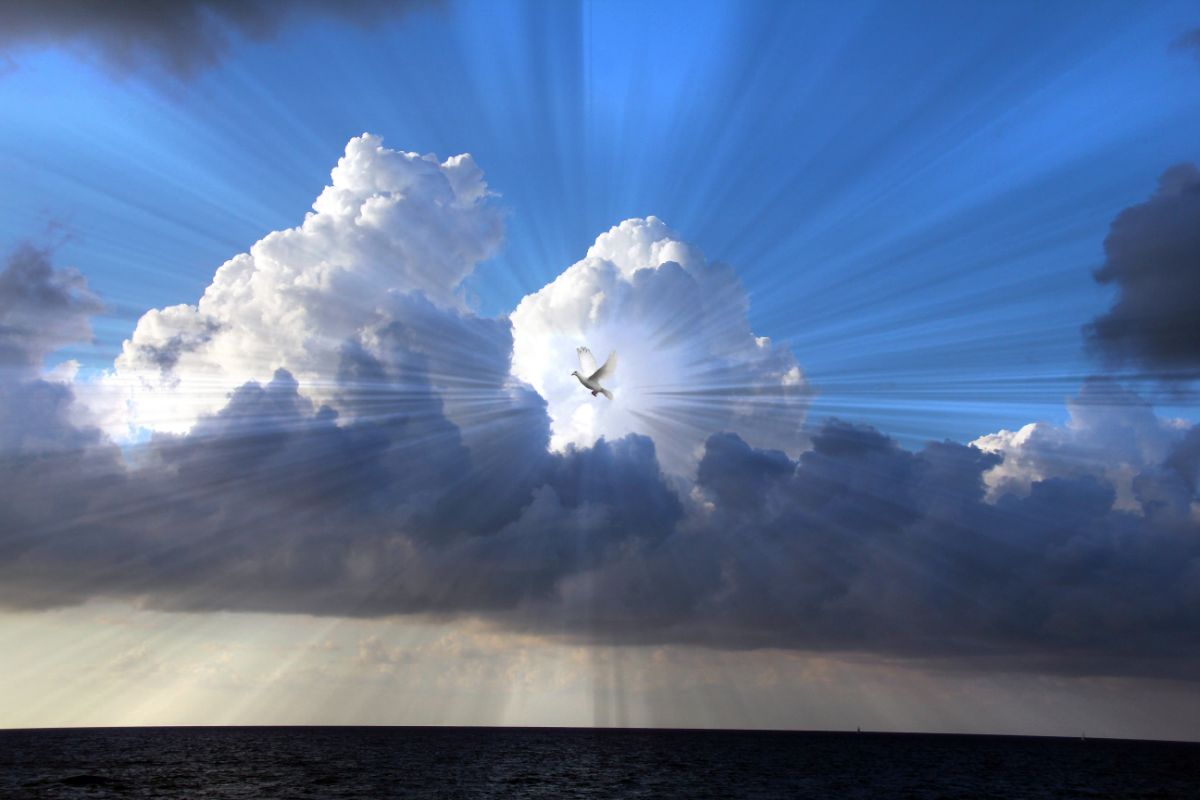
80. Kumano Kami (熊野神)
Kumano Kami is the spirit of the Kumano region in Japan.
81. Kushinada-Hime (奇稲田姫)
Kushinada-Hime is the Shinto goddess of rice.
82. Wakaukanome-no-Kami (若宇加能売神)
Wakaukanome-no-Kami is the Shinto goddess ofagriculture, streams and water.
83. Ugajin (宇賀神)
Ugajin is the harvest and fertility god in Shintoism.
84. Kuninotokotachi-no-Kami (国之常立神)
Kuninotokotachi-no-Kami is a legendary city.
85. Wakasaname-no-Kami (若狭那売神)
Wakasaname-no-Kami is the Shinto goddess of the fields.
86. Kuraokami (闇龗)
Kuraokami is a Shinto god of snow and rain.
87. Mizuhanome-no-Kami (彌都波能売神)
Mizuhanome-no-Kami is a Shinto goddess of irrigation.
88. Ugayafukiaezu-no-Mikoto (鵜葺草葺不合命)
Ugayafukiaezu-no-Mikoto is the father of Emperor Jimmu.
89. Mizumaki-no-Kami (弥豆麻岐神)
Mizumaki-no-Kami is a Shinto god of agriculture irrigation.
90. Susanoo no Mikoto (佐之男命)
Susanoo no Mikoto is the Shinto god of storms and the sea
91. Tamayori-Hime (玉依毘売命)
Tamayori-Hime is the mother of the first Emperor of Japan.
92. Suseribime-no-Kami (須勢理毘売神)
Suseribime-no-Kami is the daughter of Susanoo.
93. Yamato Takeru (日本武尊)
Yamato Takeru was a son of the legendary twelfth Emperor of Japan. He was given the legendary Kusanagi-no-Tsurugi sword.
94. Takeiwatatsu-no-Kami (健磐龍神)
Takeiwatatsu-no-Kami is the dragon-shaped deity of Emperor Jimmu.
95. Tōshō Daigongen (東照大権現)
Tōshō Daigongen is a persofinied spirit of the Shogun who united Japan after the civil war.
96. Uke Mochi (保食神)
Uke Mochi is a Shinto goddess of food.
97. Takemikazuchi-no-Kami (建御雷神)
Takemikazuchi-no-Kami is the Shinto god of thunder.
98. Toyōke-Ōmikami (豊受大神)
Toyōke-Ōmikami is an agriculture goddess.
99. Takeminakata-no-Kami (建御名方神)
Takeminakata-no-Kami was one of the original rulers of the terrestrial lands.
100. Toyotama Hime (豊玉姫)
Toyotama Hime was the daughter of the dragon god who married the grandfather of Emperor Jimmu.
101. Takenouchi-no-Sugune (武内宿禰)
Takenouchi-no-Sugune was a legendary statesman who is said to have served under different Japanese Emperors.
102. Umisachi-Hiko (海幸彦)
Umisachi-Hiko means the “gifts of the seas”. He was given a magical fishing hook by his father.
103. Ukanomitama-no-Kami (宇迦之御魂神)
Ukanomitama-no-Kami is a Shinto god of agriculture and food.
104. Wakayamakui-no-Kami (若山咋神)
Wakayamakui-no-Kami is the Shinto god of the mountains.
105. Ōkuninushi-no-Kami (大国主神)
Ōkuninushi-no-Kami was the leader of the terrestrial gods and ruler of the human world.
106. Wakumusubi-no-Kami (和久産巣日神)
Wakumusubi-no-Kami is an old Shinto god of grains.
107. Ōmagatsuhi-no-Kami (大禍津日神)
Ōmagatsuhi-no-Kami is the Shinto god of curses, evil, defilement and calamities.
108. Yamasachi-Hiko (山幸彦)
Yamasachi-Hiko is the grandfather of Emperor Jimmu.
109. Omoikane-no-Kami (思兼神)
Omoikane-no-Kami is the Shinto god of intelligence and wisdom.
110. Yamatohime-no-Mikoto (倭姫命)
Yamatohime-no-Mikoto is the legendary high priestess who founded the Ise Grand Shrine.
111. Okitsu-Hime-no-Kami (澳津姫神)
Okitsu-Hime-no-Kami is a hearth, stove and kitchen goddess.
112. Yanohahaki-no-Kami (矢乃波波木神)
Yanohahaki-no-Kami is a popular Shinto god of childbirth and the hearth.
113. Zama-no-Kami (座摩神)
Zama-no-Kami is one of the five foundational gods of the Shinto traditions.
114. Ōkuni-Mitama-no-Kami (大国御魂神)
Ōkuni-Mitama-no-Kami is the Shinto spirit of the nation.
115. Ōyamatsumi-no-Kami (大山津見神)
Ōyamatsumi-no-Kami created sweet wine for all Shinto gods.
116. Ōtoshi-no-Kami (大歳神)
Ōtoshi-no-Kami is the traditional Shinto god of the year.
117. Sanbō-Kōjin (三宝荒神)
Sanbō-Kōjin is the Shinto god of the fire, kitchen and hearth.
118. Raijin (雷神)
Raijin is the Shinto god of storms, thunder and lightning.
119. Ōyamakui-no-Kami (大山咋神)
Ōyamakui-no-Kami is the mountain god of mount Hiel near Kyoto.
120. Ryūjin (龍神)
Ryūjin is the dragon god of shintoism.
Conclusion
There is almost an infinite number of Shinto deities for almost all parts of Japanese life and land.
- How Much Money Can You Make Teaching English in Japan? - December 12, 2022
- The Best Places to Teach English in Japan - December 9, 2022
- The Best Credentials for Teaching English in Japan - December 8, 2022

